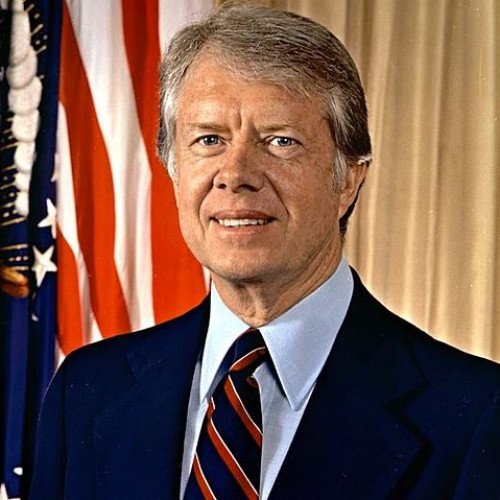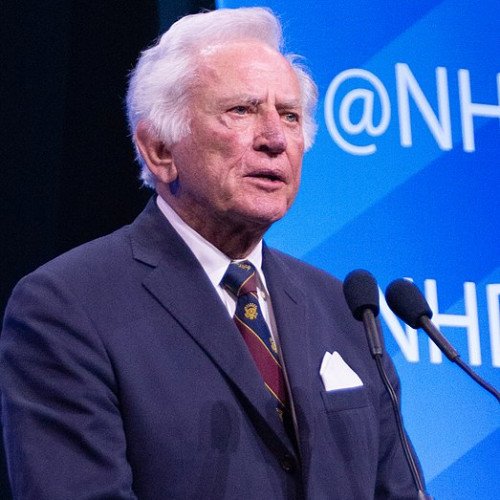Jimmy Carter VS Gary Hart

Jimmy Carter
James Earl Carter Jr. (born October 1, 1924) is an American politician and philanthropist who served as the 39th president of the United States from 1977 to 1981. A member of the Democratic Party, he previously served as a Georgia State Senator from 1963 to 1967 and as the 76th governor of Georgia from 1971 to 1975. Since leaving the presidency, Carter has remained engaged in political and social projects as a private citizen. In 2002, he was awarded the Nobel Peace Prize for his work in co-founding the Carter Center. Raised in Plains, Georgia, Carter graduated from the United States Naval Academy in 1946 with a Bachelor of Science degree and joined the United States Navy, where he served on submarines. After the death of his father in 1953, Carter left his naval career and returned home to Georgia to take up the reins of his family's peanut-growing business. Carter inherited comparatively little due to his father's forgiveness of debts and the division of the estate among the children. Nevertheless, his ambition to expand and grow the Carters' peanut business was fulfilled. During this period, Carter was motivated to oppose the political climate of racial segregation and support the growing civil rights movement. He became an activist within the Democratic Party. From 1963 to 1967, Carter served in the Georgia State Senate, and in 1970, he was elected as Governor of Georgia, defeating former Governor Carl Sanders in the Democratic primary on an anti-segregation platform advocating affirmative action for ethnic minorities. Carter remained as governor until 1975. Despite being a dark-horse candidate who was little known outside of Georgia at the start of the campaign, Carter won the 1976 Democratic presidential nomination. In the general election, Carter ran as an outsider and narrowly defeated incumbent Republican President Gerald Ford. On his second day in office, Carter pardoned all the Vietnam War draft evaders by issuing Proclamation 4483. During Carter's term as president, two new cabinet-level departments, the Department of Energy and the Department of Education, were established. He established a national energy policy that included conservation, price control, and new technology. In foreign affairs, Carter pursued the Camp David Accords, the Panama Canal Treaties, the second round of Strategic Arms Limitation Talks (SALT II), and the return of the Panama Canal Zone to Panama. On the economic front, he confronted stagflation, a persistent combination of high inflation, high unemployment and slow growth. The end of his presidential tenure was marked by the 1979–1981 Iran hostage crisis, the 1979 energy crisis, the Three Mile Island nuclear accident, and the Soviet invasion of Afghanistan. In response to the invasion, Carter escalated the Cold War when he ended détente, imposed a grain embargo against the Soviets, enunciated the Carter Doctrine, and led a 1980 Summer Olympics boycott in Moscow. In 1980, Carter faced a challenge from Senator Ted Kennedy in the primaries, but he won re-nomination at the 1980 Democratic National Convention. Carter lost the general election to Republican nominee Ronald Reagan in an electoral landslide. He is the only president in American history to serve a full term of office and never appoint a justice to the Supreme Court. Polls of historians and political scientists usually rank Carter as a below-average president. Carter's activities since leaving the presidency have been viewed more favorably than his presidency itself. In 1982, Carter established the Carter Center to promote and expand human rights. He has traveled extensively to conduct peace negotiations, monitor elections, and advance disease prevention and eradication in developing nations. Carter is considered a key figure in the Habitat for Humanity charity. He has written over 30 books, ranging from political memoirs to poetry, while continuing to actively comment on ongoing American and global affairs such as the Israeli-Palestinian conflict.
Statistics for this Xoptio

Gary Hart
Gary Warren Hart (né Hartpence; born November 28, 1936) is an American politician, diplomat, and lawyer. He was the front-runner for the 1988 Democratic presidential nomination until he dropped out amid revelations of extramarital affairs. He represented Colorado in the United States Senate from 1975 to 1987. Born in Ottawa, Kansas, he pursued a legal career in Denver, Colorado, after graduating from Yale Law School. He managed Senator George McGovern's successful campaign for the 1972 Democratic presidential nomination and McGovern's unsuccessful general election campaign against President Richard Nixon. Hart defeated incumbent Republican Senator Peter Dominick in Colorado's 1974 Senate election. In the Senate, he served on the Church Committee and led the Senate investigation regarding the Three Mile Island accident. After narrowly winning re-election in 1980, he sponsored the Semiconductor Chip Protection Act of 1984, becoming known as an "Atari Democrat". Hart sought the Democratic presidential nomination in 1984, narrowly losing the race to former Vice President Walter Mondale. Hart declined to seek re-election to the Senate in 1986 and sought the Democratic presidential nomination in 1988. He was widely viewed as the front-runner until reports surfaced of an extramarital affair, and Hart withdrew from the race in May 1987. He re-entered the race in December 1987 but withdrew from the race again after faring poorly in the early primaries. Hart returned to private practice after the 1988 election and served in a variety of public roles. He co-chaired the Hart-Rudman Task Force on Homeland Security, served on the Homeland Security Advisory Council, and was the United States Special Envoy for Northern Ireland. He earned a doctorate in politics from the University of Oxford and has written for outlets such as The Huffington Post. He has also written several books, including a biography of President James Monroe. Hart has been married to Lee (Ludwig) since 1958 and has two children.